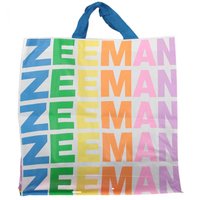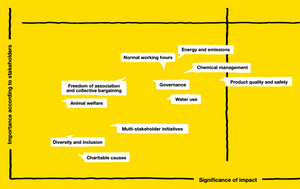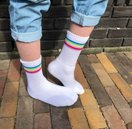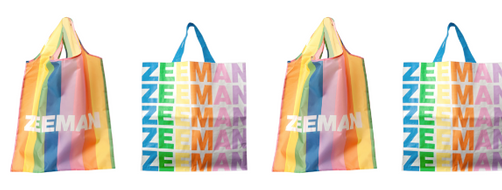Click on pictures for larger image.
Marketing the Rainbow
Case Study: Zeeman
branche: Fashion/Retail
Article last updated Feb 14, 2022
Company policy
The two key words defining the brand are Simplicity and Frugal ("eenvoud" and "zuinig"). The latter value is also attributed in relationship to the staff, in sense that they want to care for them.
Although Diversity and Inclusion are on the company's agenda, a 2019 report on Corporate Social Responsibility (CSR) from the CEO ranks it as the lowest of 20 core values as to "Significance of impact" and gives it the 19th place for "Importance according to shareholders". "Chemical management" and "water use" both score considerably higher. This does not really bode well as to their intentions. The CEO adds: "These themes represent a lower risk based on seriousness, commitment and probability, but are at least as material and do form an important part of our CSR agenda."
Under the heading Diversity it does say "No matter if you have a disability, wear a headscarf, are LGBTQ+ or are over 50. We consciously recruit employees with a disadvantage in the labor market", but sadly that is the only time our community is mentioned in a 60-page report on CSR.
Rainbows
Many of the products are "basics", monocolor items that customers can pimp with materials available in the store, or their own tools. However, the rainbow makes a frequent appearance too. This is often a 6-colored one, but the order is not always like the LGBT rainbow, so it should be assumed it is decoration only and no statement of diversity or support. In this clip we see a kids playing games, decorating the street. A few times, the rainbow is shown, including on the T-shirt of one of the boys, which also says "Awesome". It is unclear if this is LGBT-related.
Durability
An important USP is durability: they want to appeal to the generation who feels that there is too much waste and that clothing should last more than one season. There are two rainbow-adorned bags available - both at €0.99. One is made from recycled cement bags, the other is from recycled polyester but that one is refundable, so you get that Euro back when you return it. Whereas the T-shirts that were on offer (see below) had the correct rainbow on them, the bags do not.
2020 Basics
Their new basics collection from 2020 was presented as "gender neutral". Zeeman released a video where we see a colorful array of people, including a couple that looks androgynous. In a social media campaign for this video, the two are morphing into each other, as to say: "we are all the same". There were two more of these morphing clips.
In this clip we see someone who has had a breast amputation, holding a baby. This could be a transgender person, but looking beyond this image: Zeeman has a collaboration with a company that supplies low-cost breast prosthetics, so that person belongs to that campaign. We do see two women snuggled up in bed though - aLthough this cannot be deduced from the image, as no faces are shown.
This commercial caused some upheavel as it was broadcast in the interval of a EURO 2020 football game, when children were still watching. A number of pundits took offence to the shaking booties. Imagine, children being exposed to this!
Every kind of people
One type of diversity is applied: the people in the commercials and campaigns are not (super)models but everyday people. Of all ages, ethnicities and abilities. There are only few examples of LGBT representation, but sometimes the 'models' are not shown completely (i.e. without face) so it is difficult to tell whom we are watching. And there are instances where the model is androgynous or gender nonconforming.
Their two main target groups are people who need to buy cheap clothes, and those who choose to. In recent years they have successfully tried to expand those target groups, by upgrading the image, some excellent campaigns that went viral, and many awards for brand innovation and campaign effectivity. From 30+ (mothers for their young children) the audience has now expanded to 15+.
Kids and (no) labels
In the middle of the broad discussion aBout gender-neutrality, fuelled by the American bathroom battle, and competitor HEMA introducing gender-neutral clothing for young kids - they made this excellent commercial about non-conformity: "Children don't think in labels. They just are who they are: comfortably themselves. We make nice clothes for kids, so they can choose what they like". The payoff: "That's how simple it can be".
Kudos!
Conclusion
Although we have seen some groundbreaking clips from Zeeman, their corporate strategy fails to address LGBT diversity and inclusion. The scarce representation of androgynous characters, or even a (possibly) lesbian couple do convey an image of diversity, but the use of the rainbow on some items is either for decoration only, or pinkwashing. The one real LGBT rainbow was probably a result of good intentions, but without proper framework (i.e. a charity, platform, fundraiser) also: pinkwashing.
2021 Underwear
Pride 2018
For the Pride Amsterdam festival in 2018, Zeeman handed out free shirts to the crowds. They were not a sponsor of the event.
In 2021 the shirt was still for sale on their website, for only €3.99. It is being matched 'with the bags with the wrong rainbow."
© 2022 BRIGHT Marketing Solutions
2021: "Make something unique with our basics"
In this campaign video around the Basics collection we see a colorful array of people, pimping their basics from Zeeman. There is also someone putting up elaborate make-up. It is hard to tell wether this person is female or male, so that sort of makes it a diversity issue.
Introduction
Zeeman (= "Sailor") is a Dutch chain store with 1,300 establishments, selling discount clothing. They have stores in the Netherlands, Germany, Belgium, France, Luxembourg, Austria and Spain. The first store was opened by Jan Zeeman in Alphen aan den Rijn, Netherlands in March 1967. The founder was CEO until 1999 and passed away in 2020, keeping ownership of the company until then. His net worth was EUR 800 million.
















